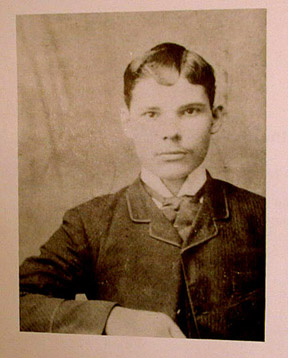The Nathan Margolis Shop
The Antiques of the Future, Margolis of Hartford, Connecticut

Nathan Margolis, Age 25
Click HERE to see my page regarding the labeling and dating of Margolis Furniture.
Click HERE to see my page with photos of various pieces of Margolis furniture.
Services: I do formal insurance and estate appraisals, and consult to major auction houses regarding authenticity and value of Margolis Furniture.
History: Nathan Margolis was born in Yanova, Lithuania in 1873, the son of Charles and Eva Margolis. His father was a cabinet maker as were his brothers Abraham, Simon, Jacob and Reuben. He immigrated to Hartford about 1892. It is interesting to note that the famed Israel Sack was also an apprentice in Yanova.
Upon his arrival in America, Nathan dealt in the sale and restoration of antique pieces, but he soon became a specialist in fabricating authentic reproductions of antique furniture. Wallace Nutting once referred to Nathan Margolis as the "best cabinet maker in America.”
The Nathan Margolis Shop, as we think of it today, opened in Hartford in 1894. Business was good and Nathan's workmanship found its way into the homes of many prominent families. Father and brothers were sent for and came to work in the shop.
Jacob Margolis relocated to New York and became an antique dealer of national reputation. Reuben (my grandfather) was also an antique dealer in the Hartford area and bought both locally and abroad for many old line Hartford and New York families.
Nathan died on February 8, 1925 and was succeeded in business by his son, Harold D. Margolis, 19 years old at the time. Harold, in turn, was commissioned to fabricate antique reproductions by many discriminating private clients, among them the Connecticut Historical Society, which undertook the task of restoring the Old State House. He restored 13 arm chairs and window stools (made by Kneeland and Adams of Hartford) and handcrafted 12 additional chairs and eight window stools and designed and built all the missing Senate tables. It is difficult to tell the old from the new, they were so skillfully crafted.
Harold Margolis continued to operate the shop until approximately 1973. The high cost of materials coupled with the scarcity of skilled craftspeople caused the shop to close its doors. Thus an era of eighty years was brought to a close.
Before the death of Harold Margolis, the shop records and patterns were sent to the Henry Francis DuPont Museum in Winterthur, Delaware, where they remain today. They are available for viewing upon appointment.